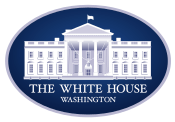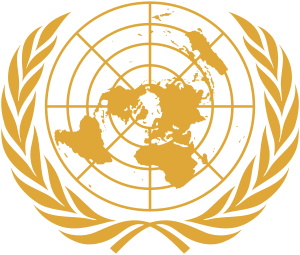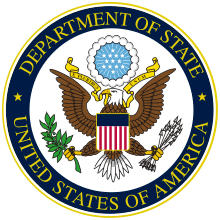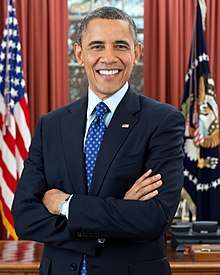Susan Rice
| Susan Rice | |
|---|---|
 | |
| 24th United States National Security Advisor | |
|
In office July 1, 2013 – January 20, 2017 | |
| President | Barack Obama |
| Deputy | Avril Haines |
| Preceded by | Thomas E. Donilon |
| Succeeded by | Michael Flynn |
| 27th United States Ambassador to the United Nations | |
|
In office January 26, 2009 – June 30, 2013 | |
| President | Barack Obama |
| Deputy |
Brooke Anderson Rosemary DiCarlo |
| Preceded by | Zalmay Khalilzad |
| Succeeded by | Samantha Power |
| 12th Assistant Secretary of State for African Affairs | |
|
In office October 14, 1997 – January 20, 2001 | |
| President | Bill Clinton |
| Preceded by | George Moose |
| Succeeded by | Walter H. Kansteiner III |
| Personal details | |
| Born |
Susan Elizabeth Rice November 17, 1964 Washington, D.C. U.S. |
| Political party | Democratic |
| Spouse(s) |
Ian Cameron (m. 1992) |
| Children | 2 |
| Relatives |
Lois Dickinson (Mother) Emmett J. Rice (Father) |
| Education |
Stanford University (BA) New College, Oxford (MPhil, DPhil) |
Susan Elizabeth Rice (born November 17, 1964) is an American public official who was the 24th United States National Security Advisor from 2013 to 2017. She was a Brookings Institution fellow and U.S. Ambassador to the United Nations. She served on the staff of the National Security Council and as Assistant Secretary of State for African Affairs during President Bill Clinton's second term. She was confirmed as UN ambassador by the U.S. Senate by unanimous consent on January 22, 2009.
Mentioned as a possible replacement for retiring Secretary of State Hillary Clinton in 2012,[1][2] Rice withdrew from consideration following controversy related to the 2012 attack on the U.S. consulate in Benghazi, saying that if she were nominated, "the confirmation process would be lengthy, disruptive, and costly."[3] She succeeded Tom Donilon as National Security Advisor on July 1, 2013.
Early life and education
Rice was born in Washington, D.C.,[4] to Emmett J. Rice (1919–2011), a Cornell University economics professor and the second black governor of the Federal Reserve System,[4] and education policy scholar Lois Rice (née Dickinson), who helped design the federal Pell Grant subsidy system and who joined the Brookings Institution in 1992.[5] Her maternal grandparents were Jamaican.[6] Her parents divorced when Rice was ten years of age.[7]
Rice was an athlete, student council president, and valedictorian at National Cathedral School in Washington, D.C., a private girls' day school.[8] She attended Stanford University, where she received a Truman Scholarship and graduated with a BA in history in 1986. She was a member of Phi Beta Kappa.[9][10]
Awarded a Rhodes Scholarship, Rice attended New College, Oxford, where she earned an MPhil in 1988 and a DPhil in 1990. The Chatham House, the Royal Institute of International Affairs, honored her dissertation entitled Commonwealth Initiative in Zimbabwe, 1979–1980: Implication for International Peacekeeping as the UK's most distinguished in international relations.[4][11]
Rice was a foreign policy aide to Michael Dukakis during the 1988 presidential election. She was a management consultant at McKinsey & Company, a global management consulting firm, from 1990 to early 1992. Rice worked in McKinsey's Toronto office for a time.[12]
Rice said that her parents taught her to "never use race as an excuse or advantage", and as a young girl she "dreamed of becoming the first U.S. senator from the District of Columbia".[4] She also held "lingering fears" that her accomplishments would be diminished by people who attributed them to affirmative action since she is not white.[4]
Clinton administration
Rice served in the Clinton administration in various capacities: at the National Security Council (NSC) from 1993 to 1997; as director for international organizations and peacekeeping from 1993 to 1995; and as special assistant to the president and senior director for African affairs from 1995 to 1997.
At the time of the 1994 Rwandan genocide, Rice reportedly said, "If we use the word 'genocide' and are seen as doing nothing, what will be the effect on the November election?" She subsequently acknowledged the mistakes made at the time and felt that a debt needed repaying.[13] The inability or failure of the Clinton administration to do anything about the genocide would form her later views on possible military interventions.[14] She said of the experience: "I swore to myself that if I ever faced such a crisis again, I would come down on the side of dramatic action, going down in flames if that was required."[15]
Islamists took control in Sudan in a 1989 coup d'état and the United States adopted a policy of disengagement with the authoritarian regime throughout the 1990s. After the September 11, 2001, terrorist attacks, however, some critics charged that the U.S. should have moderated its policy toward Sudan earlier, since the influence of Islamists there waned in the second half of 1990s and Sudanese officials began to indicate an interest in accommodating U.S. concerns with respect to 9/11 mastermind Osama bin Laden, who had been living in Sudan until he was expelled in May 1996. Timothy M. Carney, U.S. ambassador to Sudan between September 1995 and November 1997, co-authored an op-ed in 2002 claiming that in 1997 Sudan offered to turn over its intelligence on bin Laden but that Rice, as NSC Africa specialist, together with then NSC terrorism specialist Richard A. Clarke, successfully lobbied for continuing to bar U.S. officials, including the CIA and FBI, from engaging with the Khartoum government.[16] Similar allegations (that Rice joined others in missing an opportunity to cooperate with Sudan on counterterrorism) were made by Vanity Fair contributing editor David Rose[17] and Richard Miniter, author of Losing Bin Laden.[18]
Secretary of State Madeleine Albright, a longtime mentor and family friend to Rice, urged Clinton to appoint Rice as Assistant Secretary of State for African Affairs in 1997.[4] Rice was not the first choice of Congressional Black Caucus leaders, who considered her a member of "Washington's assimilationist black elite".[4] At a confirmation hearing chaired by Senator Jesse Helms, Rice, who attended the hearing along with her infant son whom she was then nursing, made a great impression on senators from both parties and "sailed through the confirmation process".[4]
Rice supported the Rwandan, Ugandan, AFDL and Angolan invasion of Zaire (later known as the Democratic Republic of the Congo) from Rwanda in 1996 and overthrow of dictator Mobutu Sese Seko, saying privately that "Anything's better than Mobutu."[19] According to Gérard Prunier, a staffer to the Assistant Secretary said that "the only thing we have to do is look the other way", with respect to Rwanda's continued intervention.[20] New York Times correspondent Howard W. French said that according to his sources, Rice herself made the remark.[21] The Congo Wars spearheaded by Rwanda led to over five million deaths. In 2012, when serving as UN ambassador, Rice opposed efforts to publicly censure Rwandan President Paul Kagame for again supporting a Congolese rebel group, this time in the 2012 Congo conflict, despite the sacking of the regional capital of Goma. The Rwandan government was a client when Rice worked at Intellibridge in 2001–02.[22]
On July 7, 1998, Rice was a member of an American delegation to visit detained Nigerian president-elect Basorun M.K.O. Abiola. During this meeting, Abiola suffered a fatal heart attack.[23]
Although Rice supported the Lomé Peace Accord,[24] some observers criticized the Sierra Leone agreement as too indulgent of the Revolutionary United Front (RUF) and for bringing the war criminal Foday Sankoh into government, leading to the adoption of United Nations Security Council Resolution 1313, which blamed the RUF for the continuing conflict in the west African country.[25]
Business and think-tank activities
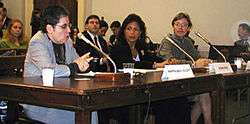
Rice was managing director and principal at Intellibridge from 2001 to 2002.[26][27] In 2002, she joined the Brookings Institution as senior fellow in the foreign policy program. At Brookings, she focused on U.S. foreign policy, weak and failing states, the implications of global poverty, and transnational threats to security.
During the 2004 presidential campaign, Rice served as a foreign policy adviser to John Kerry.[28]
Rice went on leave from the Brookings Institution to serve as a senior foreign policy adviser to Barack Obama in his 2008 presidential campaign. She was one of the first high-profile foreign policy staffers to sign onto Obama's campaign, as most of her peers had supported Hillary Clinton during the presidential primaries.[29] Rice took a disparaging view of Obama's Republican opponent in the campaign, John McCain, calling his policies "reckless" and dismissing the Arizona senator's trip to Iraq as "strolling around the market in a flak jacket".[30]
On November 5, 2008, Rice was named to the advisory board of the Obama–Biden Transition Project.[31]
Obama administration
U.S. Ambassador to the United Nations

On December 1, 2008, Rice was nominated by president-elect Obama to be the U.S. Ambassador to the United Nations,[32][33] a position which he restored to cabinet level.[34] Rice became the second youngest person[34] and the first African American woman to represent the U.S. at the UN.[35] Reportedly Rice had coveted the post of National Security Advisor, which instead went to retired United States Marine Corps General, James L. Jones, and she and most of Obama's original foreign policy team were disappointed that they were not picked for the top posts in Obama's administration.[29]

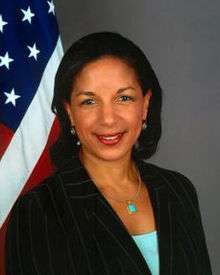
Rice had a poor relationship with State Department veteran Richard Holbrooke, whom she considered to be meddling on her turf and who in return had viewed her as incompetent.[29]
The 2010 National Security Strategy was referred to by Rice as a "dramatic departure" from its predecessor.[36]
Libyan Civil War
As the 2011 Libyan Civil War progressed, Rice made clear that the United States and the international community saw a clear choice for Gaddafi and his aides: step down from power or face significant consequences. Rice offered some of the toughest rhetoric toward Gaddafi, blasting his denials of atrocities against his own citizens as "frankly, delusional". Several UN diplomats said that in a closed door meeting on April 28, Rice's claims of Gaddafi's atrocities included the issuance of Viagra to loyalists in order to further terrorize the population with sexual violence.[37][38] Together with National Security Council figure Samantha Power, who already supported military intervention, and Secretary of State Hillary Rodham Clinton, who came to support it, the three overcame internal opposition from Defense Secretary Robert Gates, security adviser Thomas E. Donilon, and counterterrorism adviser John Brennan, to have the administration advance a UN proposal to impose a no-fly zone over Libya and authorize other military actions as necessary.[14][39] On March 17, 2011, the UK, France and Lebanon joined the U.S. to vote for United Nations Security Council Resolution 1973 while Brazil, Germany, and India joined permanent Security Council members China and Russia in abstaining. Rice and Clinton played major roles in gaining approval for the resolution.[14][40] Clinton said the same day that establishing a no-fly zone over Libya would require the bombing of air defenses. Rice said, "we are interested in a broad range of actions that will effectively protect civilians and increase the pressure on the Gaddafi regime to halt the killing and to allow the Libyan people to express themselves in their aspirations for the future freely and peacefully".[41]
In January 2012, after the Russian and Chinese veto of another Security Council resolution calling on Syrian President Bashar al-Assad to step down, Rice strongly condemned both countries, saying, "They put a stake in the heart of efforts to resolve this conflict peacefully", and adding that "we the United States are standing with the people of Syria. Russia and China are obviously with Assad".[42] In her words, "the United States is disgusted that a couple of members of this Council continue to prevent us from fulfilling our sole purpose".[43]
Some Security Council diplomats took issue with Rice's negotiating style, calling it "rude" and overly blunt. According to David Rothkopf of Foreign Policy magazine, Rice is known for her "abrasiveness" but has the asset of a close relationship with the U.S. president. Human rights activists took issue with Rice and U.S. foreign policy generally in 2012 for working against UN statements that criticized Rwanda for supporting a rebel group in Congo known for committing atrocities.[44]
2012 Benghazi attack
On September 11, 2012, the U.S. diplomatic mission in Benghazi, Libya was attacked, resulting in the deaths of the United States Ambassador to Libya J. Christopher Stevens, U.S. Foreign Service Information Management Officer Sean Smith, and two former Navy SEALS, Glen Doherty and Tyrone S. Woods. On September 16, Rice appeared on CBS's political TV show Face the Nation and ABC's This Week to state that the attack was a direct result of a "heinous and offensive video", and was spontaneous, not preplanned.[45] She added (on a different subject), "[w]e've decimated al-Qaeda." By contrast, Patrick F. Kennedy, the under secretary of state for management, had said prior to her interview that he believed the assault was planned,[46] and other sources, including Libyan President Mohammed Magariaf, had expressed the view that the attack was pre-planned and that there was an al-Qaeda link.[47]
Rice qualified her remarks about the attack, saying, "We'll want to see the results of [an FBI] investigation to draw any definitive conclusions."[48] She made similar statements on This Week with George Stephanopoulos,[49] Meet the Press,[50] State of the Union with Candy Crowley,[51] and Fox News Sunday.[52] 97 House Republicans sent a letter to President Obama on November 19 to say Rice's statements were "misleading" and that she should accordingly not be considered a candidate to succeed Hillary Clinton in 2013 as Secretary of State.[53]
Rice stated that her claims about Benghazi were based on the unclassified version of information approved by United States intelligence services.[54][55] Some Republican Senators, who would have had a vote on whether to confirm Rice, also voiced objections and said their meetings with Rice at the end of November 2012 did not ease their concerns.[56][57][58]
The Senate supported a resolution saying, "the violence in Benghazi coincided with an attack on the United States Embassy in Cairo, Egypt, which was also swarmed by an angry mob of protesters on September 11, 2012", and making no mention of Al Qaeda.[59] During a House hearing on May 8, 2013, an email, which was never classified, that was sent on September 12, 2012, to Susan Rice as well as many other members of the State Department, was read aloud by Representative Trey Gowdy (R-SC). The email stated clearly that the attacks were committed by Islamists, with no mention of an "angry mob" or protestors.[60] Gowdy said the Obama administration was "changing names" and "creating aliases" of Benghazi survivors and "dispersing them around the country" to keep them out of sight.[61] According to The New York Times, both protestors angered by an anti-Muslim video and Islamic militants were involved, but no links to Al Qaeda or other officially known terrorist groups were found. It said, "Anger at the video motivated the initial attack."[62] Khattala, an alleged terrorist who was captured for his role in directing attackers, said "From a religious point of view, it is hard to say whether it is good or bad."[63] On December 13, 2012, in a letter to President Barack Obama, Rice asked him to remove her name from consideration for Secretary of State.[3]
National Security Advisor

Rice was picked to succeed Tom Donilon as National Security Advisor immediately following Donilon's resignation on June 5, 2013.[64] The position of National Security Advisor does not require Senate approval.[65] Rice was sworn in as the 24th National Security Advisor on July 1, 2013.[66]
In May 2014, Rice traveled to Israel for meetings with Israeli officials in which nuclear talks with Iran were discussed. Rice's visit, the first in her role as national security adviser, came as peace talks between Israel and the Palestinians collapsed. The Obama administration made clear that Rice's trip was part of regularly scheduled talks and that the stalled Middle East peace discussions were not on the agenda. However, White House Spokesman Jay Carney said negotiations with Iran over its nuclear program would be on the agenda, among other topics.[67]
Rice has been criticized for intensifying the Obama administration's conflicts with Israel during her time as National Security Advisor. Dennis Ross, a Middle East advisor to President Obama, criticized Rice's "combative mind-set" as opposed to her predecessor's, Tom Donilon, who played a more conciliatory role. Ross writes that after Israeli Prime Minister Netanyahu's public reprimand of the Obama administration's Iran negotiations, Rice fumed to Abe Foxman that, "in her view, the Israeli leader did everything but use 'the N-word' in describing the president".[68][69]
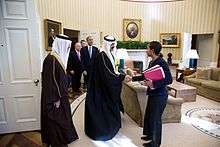
In releasing the 2015 National Security Strategy, Rice said that the US was pursuing an "ambitious yet achievable agenda" overseas. She argued that U.S. leadership had been essential for success on issues including Ebola, Iran's nuclear program and sanctioning Russia over Ukraine. Her comments came as President Obama sent his national security strategy to Congress. The document formed a blueprint for foreign policy, defense and national security for the last two years of President Obama's term. It had previously been updated in 2010. In a letter outlining the strategy, President Obama said that the US would "always defend our interests and uphold our commitments to allies and partners", adding, "But we have to make hard choices among many competing priorities and we must always resist the overreach that comes when we make decisions based upon fear."[70]
On a visit to Pakistan in 2015, Rice warned Pakistani political and military leaders that attacks in Afghanistan by militants based in Pakistan threatened regional security. Rice also delivered an invitation from President Obama for Prime Minister Nawaz Sharif to visit the United States in October. The meetings came at a tense time for Pakistan's relations with neighboring Afghanistan and archrival India, along with uncertainty over whether the United States would release $300 million in military aid to Pakistan. Media reports suggested the money could be held back if the United States determined Pakistan was not doing enough to combat the Haqqani network, accused of some of the deadliest attacks in neighboring Afghanistan.[71]
In a 2015 speech on US-China relations, Rice noted the problems of Chinese hacking, saying, "This isn't a mild irritation. It is an economic and national security concern to the United States. It puts enormous strain on our bilateral relationship, and it is a critical factor in determining the future trajectory of U.S.-China ties."[72]
Post-Obama administration
On April 3, 2017, Eli Lake reported in Bloomberg View that as National Security Advisor, Rice had requested that the identities of some Americans mentioned in intelligence reports related to the campaign and presidential transition of Donald Trump be unmasked.[73] Any request for an American's identity to be unmasked required approval by the National Security Agency; NSA Director Michael Rogers said the NSA evaluated each request to determine "Is there a valid need to know in the course of the execution of their official duties?" and "Is the identification necessary to truly understand the context of the intelligence value that the report is designed to generate?"[74] Rice said that she asked for identities of U.S. persons to be revealed to provide context to the intelligence reports, and not for political purposes.[75][76]
The report of Rice unmasking Trump officials followed the announcement of the Chair of the House Intelligence Committee, Republican Devin Nunes, "that he had seen reports indicating that Mr. Trump or his associates might have been 'incidentally' swept up in the monitoring of foreigners".[76] The Committee was investigating both Trump's ties to Russian attempts to influence the 2016 election and Trump's unfounded allegations that President Obama had Trump Tower under surveillance.[73] Lake's April 3 report of the unmasking specified "Rice's requests to unmask the names of Trump transition officials do not vindicate Trump's own tweets from March 4 in which he accused Obama of illegally tapping Trump Tower."[73] Nevertheless, Republicans called for an investigation into the unmasking while Democrats claimed the unmasking story was a diversion from the Russian influence investigation.[76]
After members of the Senate and House Intelligence Committees were able to view the material on which Nunes based his assertions, a number of news organizations reported that both Democrats and Republicans familiar with the material said that there was "no evidence that Obama administration officials did anything unusual or illegal".[77][78][79] The report also called Rice's unmasking requests "normal and appropriate".[77]
In August 2017, Eli Lake reported in Bloomberg View that Rice's successor as National Security Adviser, H.R. McMaster, "has concluded that Rice did nothing wrong".[80]
Rice informed the House Intelligence Committee in September 2017 that she requested the unmasking because of a redacted report provided by the intelligence services concerning an undisclosed visit to the US by UAE crown prince Mohammed bin Zayed Al Nahyan in December 2016. During the visit al-Nahyan met with Steve Bannon, Michael Flynn and Jared Kushner at Trump Tower in New York.[81]
On March 8, 2017, Rice joined American University as a Distinguished Visiting Research Fellow in the School of International Service (SIS) at the university. In her residency she plans to work on her next book and mentoring young SIS students.[82]
On March 28, 2018, Rice was appointed to the Board of Directors at Netflix.[83]
After US Senator Susan Collins voted in favor of Brett Kavanaugh for the Supreme Court, Rice publicly considered a challenge to Collins in 2020.[84][85]
Affiliations

Rice serves on the boards of several organizations, including the advisory board of Freeman Spogli Institute for International Studies at Stanford University,[86] the board of directors of the Bureau of National Affairs, Inc. (Bloomberg BNA),[87] and the board of directors of Partnership for Public Service.[88] She is a past member of the boards of directors of the National Democratic Institute, the U.S. Fund for UNICEF,[26] the Atlantic Council[89] and Internews Network.[90][91] She is also a member of the Council on Foreign Relations and the Aspen Strategy Group.[92][93]
Personal life
Rice married Canadian-born ABC News producer Ian Officer Cameron[94] on September 12, 1992, at the St. Albans School chapel.[12] They met as students at Stanford.[95] They have two children, son John David Rice-Cameron (known as Jake and president of the Stanford College Republicans or SCR) and daughter Maris.[9][88]
Rice is an avid tennis player, often playing on weekends.[96]
Awards and honors
Rice was inducted into Stanford's Black Alumni Hall of Fame in 2002.[11]
Publications
- Rice, Susan Elizabeth. 1990. The Commonwealth Initiative in Zimbabwe, 1979–1980: Implications for International Peacekeeping, doctoral thesis, New College, Oxford University.
References
- ↑ "Susan Rice likely Hillary Clinton replacement". cbsnews.com. Retrieved November 13, 2012.
- ↑ DeYoung, Karen; Miller, Greg (November 13, 2012). "Obama considering John Kerry for job of defense secretary". articles.washingtonpost.com. Archived from the original on December 8, 2012. Retrieved November 12, 2012.
- 1 2 Tracy Connor (December 13, 2012), Susan Rice drops out of running for secretary of state, cites 'very politicized' confirmation process NBC News
- 1 2 3 4 5 6 7 8 "The Meteoric Rise of the State Department's Susan Rice." The Journal of Blacks in Higher Education: 20 (Summer 1998), p. 40-41.
- ↑ "Lois Dickson Rice". Brookings Institution. Retrieved April 5, 2017.
- ↑ "SO Who Knew? – Susan Rice". Jamaica Observer. 2 December 2012. Retrieved 18 August 2013.
- ↑ Roig-Franzia, Manuel (November 29, 2012). "Susan Rice: Not your typical diplomat". Washington Post. Retrieved March 4, 2015.
- ↑ Brant, Martha (January–February 2000). "Feature Story – Into Africa". Stanford Magazine. Stanford Alumni Association. Retrieved December 4, 2008.
- 1 2 "Susan Elizabeth Rice". Who's Who. Marquis Who's Who. 2007. pp. K2014871257. Retrieved May 14, 2008.
- ↑ MacFarquhar, Neil. "Susan E. Rice" (Reference). The New York Times. Times Topics: People. Retrieved December 3, 2008.
- 1 2 "Black Community Services Center Hall of Fame." Stanford Alumni Association.
- 1 2 "WEDDINGS; Susan E. Rice, Ian Cameron". New York Times. September 13, 1992. Retrieved 2014-02-24.
- ↑ Power, Samantha (September 2001). "Bystanders to Genocide" (Article). The Atlantic. Retrieved December 2, 2008.
- 1 2 3 Cooper, Helene; Myers, Steven Lee (2011-03-18). "Obama Takes Hard Line With Libya After Shift by Clinton". The New York Times. Retrieved 2011-03-20.
- ↑ Carney, Timothy (2011-03-28) Obama aides find moral clarity in Libya's foggy war Archived March 28, 2011, at the Wayback Machine., The Washington Examiner
- ↑ Carney, Timothy; Ijaz, Mansoor (June 30, 2002). "Intelligence Failure? Let's Go Back to Sudan". The Washington Post. Retrieved December 1, 2008. Retrieved from www.mafhoum.com/ Jan. 2015.
- ↑ Rose, David (January 2002). "The Osama Files". Vanity Fair. Retrieved December 1, 2008.
- ↑ Belz, Mindy (November 1, 2003). "Clinton did not have the will to respond". World. Retrieved December 1, 2008.
- ↑ "Losing Africa, Yet Again" (Article). Newsweek. Policy. October 5, 2008. Retrieved December 4, 2012.
- ↑ Prunier, Gérard (2009). Africa's World War:Congo, the Rwandan Genocide, and the Making of a Continental Catastrophe. Oxford University Press. p. 339. ISBN 978-0-19-537420-9.
- ↑ Howard W. French (September 24, 2009), Kagame’s Hidden War in the Congo The New York Review of Books
- ↑ Cooper, Helene (9 December 2012). "U.N. Ambassador Questioned on U.S. Role in Congo Violence". The New York Times.
- ↑ "Abiola's death – an eyewitness account". BBC News. July 7, 1998.
- ↑ Brett Stephens (December 10, 2012), The Other Susan Rice File The Wall Street Journal
- ↑ Dorman, Andrew M. (2009). Blair's Successful War: British Military Intervention in Sierra Leone. Farnham: Ashgate Publishing. pp. 115–117. ISBN 9780754672999.
- 1 2 "Susan Rice". U.S. Fund for UNICEF. Archived from the original on April 22, 2008. Retrieved May 13, 2008.
- ↑ "Black Alumni Hall of Fame Inductees". Stanford Alumni – Reunion Homecoming 2008. Stanford University. February 2008. Retrieved May 13, 2008.
[inducted] 2002
- ↑ Pickert, Kate (2 December 2008). "U.N. Ambassador: Susan E. Rice". Time.
- 1 2 3 "Susan Rice Isn't Going Quietly". The New Republic. 2012-12-20. Retrieved 2013-09-03.
- ↑ Milbank, Dan (16 November 2012). "Susan Rice's tarnished resume". The Washington Post.
- ↑ Sweet, Lynn (November 5, 2008). "Jarrett, Podesta, Rouse to lead Obama transition; Bill Daley co-chair". Chicago Sun-Times. The scoop from Washington. Archived from the original (Blog) on December 10, 2008. Retrieved December 5, 2008.
- ↑ "Key members of Obama-Biden National Security Team announced". Newsroom. Office of the President-elect. December 1, 2008. Archived from the original (Press release) on December 1, 2008. Retrieved December 1, 2008.
- ↑ Rhee, Foon (December 1, 2008). "Obama names national security team" (Article). Boston Globe. News. Retrieved December 1, 2008.
- 1 2 "Ambassador to the United Nations – Susan Rice (Announced)" (Blog). Obama's Cabinet. Real Clear Politics. December 1, 2008. Retrieved December 4, 2008.
- ↑ Lederer, Edith M. (December 1, 2008). "Trusted Obama adviser Susan Rice is first African-American woman named to be US envoy to UN". Star Tribune. Associated Press. Archived from the original on December 5, 2008.
- ↑ Sanger, David E.; Baker, Peter (May 27, 2010). "New U.S. Security Strategy Focuses on Managing Threats". The New York Times. Retrieved May 27, 2010.
- ↑ Youngman, Sam (February 28, 2011). "UN ambassador: Gadhafi 'delusional'". The Hill. Retrieved November 14, 2012.
- ↑ Louis Charbonneau (April 29, 2011), U.S. envoy: Gaddafi troops raping, issued Viagra Reuters
- ↑ Thrush, Glenn (March 17, 2011). "Day after saying no second term, a big win for Hillary Clinton". The Politico. Retrieved March 17, 2011.
- ↑ Thrush, Glenn; Negrin, Matt (March 19, 2011). "Behind Barack Obama's turnaround on Libya". The Politico. Retrieved March 20, 2011.
- ↑ Helguero, Gerald (March 17, 2011). "U.S. Supports Libya No-Fly Zone, Seeks Broader Action". International Business Times. Archived from the original on July 15, 2012. Retrieved November 14, 2012.
- ↑ Cohn, Alicia M. (February 6, 2012). "Amb. Rice says Russia, China will 'come to regret' vetoing UN Syria resolution". The Hill. Retrieved November 14, 2012.
- ↑ "U.N. rights council condemns Syrian abuses". CNN. February 4, 2012. Archived from the original on February 6, 2012.
- ↑ Charbonneau, Louis; Cornwell, Susan (November 24, 2012). "Backed by Obama, sharp-tongued Susan Rice battles critics". Reuters.
- ↑ McKinnon, John D.; Boles, Corey (September 16, 2012). "Susan Rice: Libya Protests 'Hijacked' by Extremists". The Wall Street Journal.
- ↑ Sengupta, Kim (September 14, 2012). "Revealed: inside story of US envoy's assassination". The Independent.
- ↑ Robertson, Nic; Cruickshank, Paul; Lister, Tim (13 September 2012). "Pro-al Qaeda group seen behind deadly Benghazi attack". CNN.
- ↑ ""Face the Nation" transcripts, September 16, 2012: Libyan Pres. Magariaf, Amb. Rice and Sen. McCain". CBS News. September 16, 2012. Retrieved November 14, 2012.
- ↑ "'This Week' Transcript: U.S. Ambassador to the United Nations Susan Rice". ABC News. September 16, 2012. Retrieved November 14, 2012.
- ↑ "September 16: Benjamin Netanyahu, Susan Rice, Keith Ellison, Peter King, Bob Woodward, Jeffrey Goldberg, Andrea Mitchell". NBC News. September 16, 2012. Retrieved November 14, 2012.
- ↑ "Interview with Benjamin Netanyahu; Interview with Susan Rice; Interview with Nancy Pelosi; Interview with Rudy Giuliani". CNN. September 16, 2012. Retrieved November 14, 2012.
- ↑ Tapper, Jake (September 16, 2012). "Ambassador Susan Rice: Libya Attack Not Premeditated". ABC News. Retrieved November 14, 2012.
- ↑ Ure, Laurie. "Republicans Increase Pressure on Obama over Rice." CNN. Cable News Network, 20 Nov. 2012. Web. 12 Feb. 2016. <http://www.cnn.com/2012/11/20/politics/benghazi-house-letter/>.
- ↑ Editorial Board (22 November 2012). "The GOP's bizarre attack on Susan Rice". The Washington Post. Retrieved 2 September 2015.
- ↑ Sources: Office of the DNI cut "al Qaeda" reference from Benghazi talking points, and CIA, FBI signed off, CBS News, 20 November 2012
- ↑ O'Keefe, Ed (November 26, 2012),Susan Rice meets Tuesday with John McCain, Lindsey Graham, Kelly Ayotte, Washington Post
- ↑ Republican senators say Rice meeting just leaves more questions unanswered, Fox News, 27 November 2012.
- ↑ O'Keefe, Ed (November 28, 2012), Susan Rice meets with more GOP critics, Washington Post
- ↑ Franke-Ruta, Garance (4 December 2012). "Susan Rice's Senate Opponents Voted for Resolution on Benghazi Protests". The Atlantic.
- ↑ "Hearing: Jets Might Have Prevented Mortar Attack on Benghazi Compound". PBS News Hour. 7 May 2013. Retrieved 18 August 2013.
- ↑ DeGerolamo, David (5 November 2013). "Rep. Trey Gowdy's Explosive Claim About Benghazi Survivors". NC Renegade. Retrieved 2 September 2015.
- ↑ Kirkpatrick, David D. (28 December 2013). "A Deadly Mix in Benghazi". The New York Times.
- ↑ Kirkpatrick, David D. (17 June 2014). "Brazen Figure May Hold Key to Mysteries". The New York Times.
- ↑ Memmott, Mark (June 5, 2013), Shakeup: Susan Rice To Be Obama's National Security Adviser, National Public Radio
- ↑ June, Daniel (15 June 2013). "Susan Rice to Replace Tom Donilon as National Security Adviser". JDJournal.com.
- ↑ "Susan Rice joins White House as National Security Advisor". The Economic Times. 2 July 2013. Retrieved 18 August 2013.
- ↑ Felsenthal, Mark (6 May 2014). "Iran on agenda for White House aide talks in Israel". Reuters.com. Washington. Retrieved 2 September 2015.
- ↑ "How Obama Got to 'Yes' on Iran: The Inside Story". Politico. October 8, 2015. Retrieved 2016-04-11.
- ↑ Ross, Dennis (13 Oct 2015). Doomed to Succeed: The U.S.-Israel Relationship from Truman to Obama. Macmillan. p. 366. ISBN 9780374709488.
- ↑ "Susan Rice: US has ambitious but achievable agenda". BBC News. 6 February 2015. Retrieved 2 September 2015.
- ↑ "US national security advisor warns Pakistan on recent militant attacks". Reuters. 2017-08-30. Retrieved 2017-04-04.
- ↑ "National Security Advisor Susan E. Rice's As Prepared Remarks on the U.S.-China Relationship at George Washington University". whitehouse.gov. 2015-09-21. Retrieved 2017-04-04.
- 1 2 3 Lake, Eli (2017-04-03). "Susan Rice Sought Names of Trump Associates in Intel". Bloomberg View. Retrieved 2017-04-05.
- ↑ Lizza, Ryan (4 April 2017). "Susan Rice and the Latest Bogus Attempt to Justify Trump's Wiretapping Tweet". The New Yorker.
- ↑ Shabad, Rebecca (4 April 2017). "Susan Rice says unmasking of names wasn't for political purposes".
- 1 2 3 Baker, Peter (2017-04-04). "Susan Rice, Ex-National Security Adviser, Now in Spotlight in Surveillance Debate". The New York Times. ISSN 0362-4331. Retrieved 2017-04-05.
- 1 2 CNN, Jim Sciutto, Manu Raju and Eric Bradner. "Classified docs contradict Nunes surveillance claims, GOP and Dem sources say". CNN. Retrieved 2017-04-20.
- ↑ "Susan Rice did nothing wrong, say Dem and GOP congressional aides". NBC News. Retrieved 2017-04-20.
- ↑ "The Continuing Fallout from Trump and Nunes's Fake Scandal". The New Yorker. 2017-04-18. Retrieved 2017-04-20.
- ↑ Lake, Eli. "You Can Thank Leakers for New Russia Sanctions". Bloomberg View. Retrieved 8 June 2018.
- ↑ Raju, Manu (September 14, 2017). "Rice told House investigators why she unmasked senior Trump officials". CNN.
- ↑ "Ambassador Susan Rice Joins American University School of International Service | News | School of International Service | American University, Washington DC". American University. Retrieved 2018-02-02.
- ↑ Spangler, Todd (2018-03-28). "Netflix Names Former Obama Adviser and U.N. Ambassador Susan Rice to Board". Variety. Retrieved 2018-10-07.
- ↑ CNN, Eric Bradner,. "Susan Rice tweets 'Me' when asked who could challenge Sen. Collins in 2020". CNN. Retrieved 2018-10-07.
- ↑ "Does Collins already have a challenger in Maine? 'Me,' says former Obama official". USA TODAY. Retrieved 2018-10-07.
- ↑ "Freeman Spogli Institute for International Studies Annual Report 2007" (PDF). Stanford University. 2007. p. 47. Archived from the original (PDF) on May 16, 2008. Retrieved May 6, 2008.
- ↑ Bolbach, Cynthia J. (March 28, 2008). "Proxy Statement Pursuant to Section 14 (a) of the Securities Exchange Act of 1934". The Bureau of National Affairs, Inc. p. 3. Retrieved May 13, 2008.
[Rice a director since 2004]
- 1 2 "Board of Directors – Susan E. Rice, Ph.D". The Partnership for Public Service. Archived from the original on November 21, 2008. Retrieved May 13, 2008.
- ↑ "The Atlantic Council of the United States – Board Members". The Atlantic Council of the United States. Archived from the original on April 15, 2008. Retrieved May 13, 2008.
- ↑ "2003 Annual Report" (PDF). Internews International. 2003. p. 10. Archived from the original (PDF) on June 25, 2008. Retrieved May 13, 2008.
- ↑ "Internews – Directors and Officers". Internews International. Archived from the original on June 12, 2008. Retrieved May 13, 2008.
- ↑ Väliverronen, Jari (September 13, 2002). "Susan Rice, Former White House and State Department Senior Official, Joins Brookings Institution". Brookings Institution. Archived from the original on November 2, 2007. Retrieved May 14, 2008.
- ↑ "Aspen Strategy Group". Aspen Institute. Archived from the original on April 21, 2008. Retrieved May 14, 2008.
- ↑ "The Calgary Sun – Susan Rice on tap to become the U.S. ambassador to the United Nations". Calgary Sun. November 25, 2008. Retrieved December 28, 2008.
- ↑ Pickert, Kate (December 2, 2008). "U.N. Ambassador: Susan E. Rice – Obama's White House – TIME". Time. Retrieved December 28, 2008.
- ↑ Fletcher, Michael A. (2016-06-29). "Susan Rice Talks Diversity, Sports and Night Fears". The Undefeated. ESPN Internet Ventures. Retrieved 2017-04-05.
External links
| Wikisource has original works written by or about: Susan Elizabeth Rice |
| Wikimedia Commons has media related to Susan Rice. |
- United States Mission to the United Nations
- Susan Rice on Facebook
- Susan Rice on Twitter

- Article archive at the Brookings Institution
- Appearances on C-SPAN
- Susan Rice on Charlie Rose
- Susan Rice on IMDb
- "Susan Rice collected news and commentary". The New York Times.
- Susan E. Rice collected news and commentary at The Washington Post
- Works by or about Susan Rice in libraries (WorldCat catalog)
- BBC Radio 4 Profile
- Articles
- The Ethiopian-Eritrean War: U.S. Policy Options Before the House Committee on International Relations, Africa Subcommittee, May 25, 1999. . Retrieved 2008-05-13.
- Martha Brant, Into Africa, Stanford Magazine, Jan–Feb 2000
- Interview with Dave Ross on MyNorthwest.com (audio)
- Profile on Foreign Policy
- Documents
| Political offices | ||
|---|---|---|
| Preceded by George Moose |
Assistant Secretary of State for African Affairs 1997–2001 |
Succeeded by Walter Kansteiner |
| Preceded by Tom Donilon |
National Security Advisor 2013–2017 |
Succeeded by Mike Flynn |
| Diplomatic posts | ||
| Preceded by Zalmay Khalilzad |
United States Ambassador to the United Nations 2009–2013 |
Succeeded by Rosemary DiCarlo Acting |
